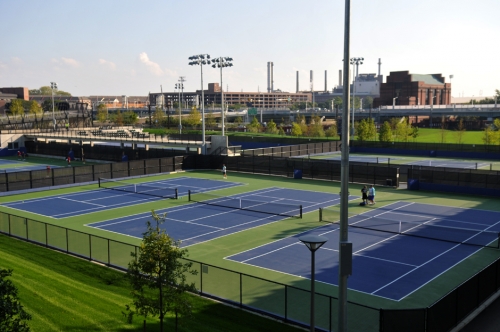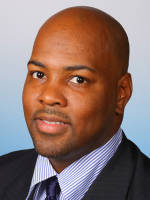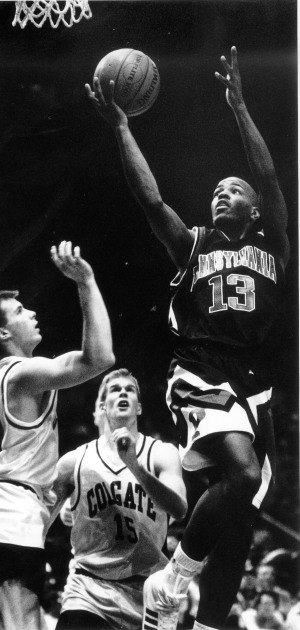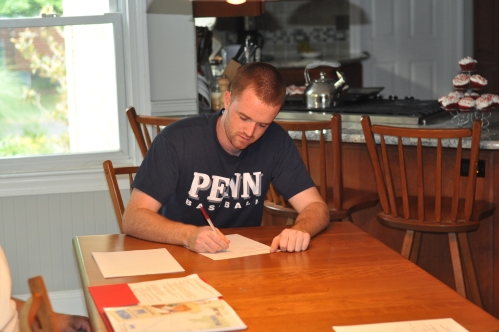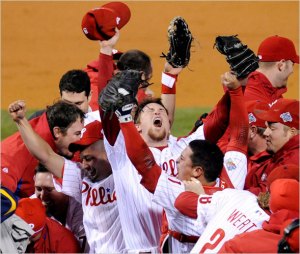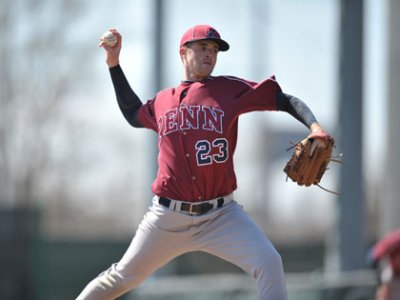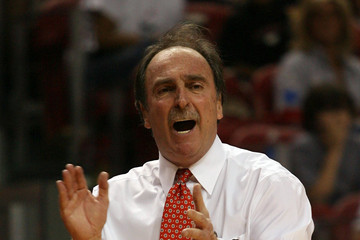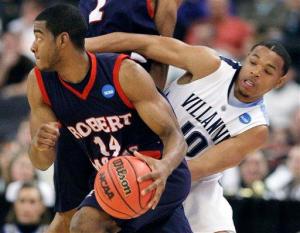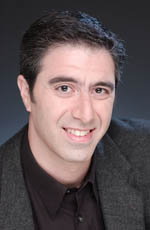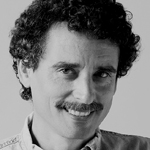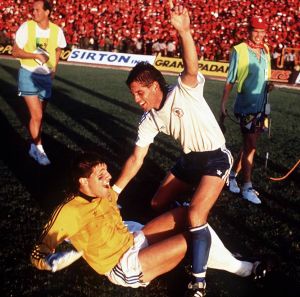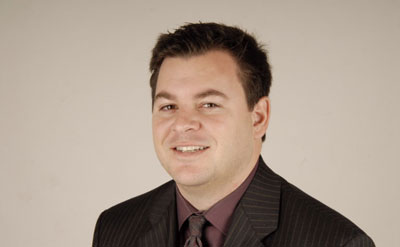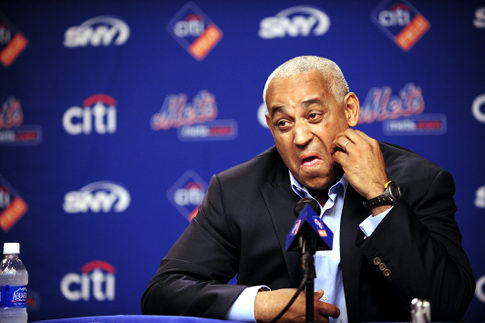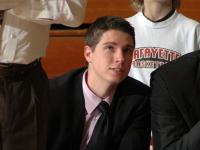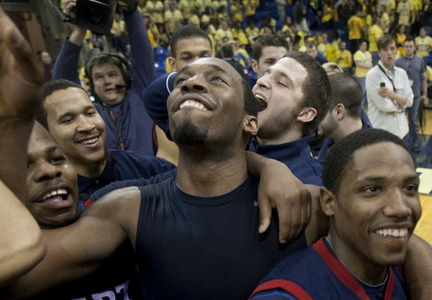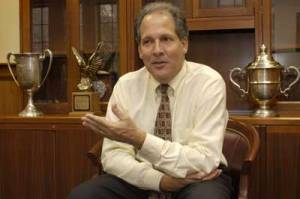 On Sunday, Penn’s Director of Athletics, Steve Bilsky W’71, will be inducted into the National Jewish Sports Hall of Fame and Museum. It’s a big honor for Bilsky, who was a standout point guard for Penn, where he captained the famous 1970-71 team to a perfect regular season, and has been the athletic director at his alma mater for the last 19 years. Leading up to Sunday’s induction ceremony at the Suffolk Y JCC in Commack, N.Y. (near where Bilsky grew up), I caught up with the Penn AD to discuss the honor and the state of Penn athletics under his watch.
On Sunday, Penn’s Director of Athletics, Steve Bilsky W’71, will be inducted into the National Jewish Sports Hall of Fame and Museum. It’s a big honor for Bilsky, who was a standout point guard for Penn, where he captained the famous 1970-71 team to a perfect regular season, and has been the athletic director at his alma mater for the last 19 years. Leading up to Sunday’s induction ceremony at the Suffolk Y JCC in Commack, N.Y. (near where Bilsky grew up), I caught up with the Penn AD to discuss the honor and the state of Penn athletics under his watch.
What does it mean for you to get inducted into the Jewish Sports Hall of Fame?
It’s a great honor. Any time you’re selected to a Hall of Fame, obviously it’s a lot of pride, you’re humbled and so forth. And then you look at all the people that have previously been inducted and it’s not just a who’s who of great Jewish athletes and media types, but for me personally it represents household names growing up: Sandy Koufax, Dolph Schayes, Howard Cosell, Red Auerbach, who I got to know when I was at George Washington. To think I’m going to be enshrined into something that includes them, it just makes you real humble.
How does this honor compare to some other Hall of Fames you’ve been inducted into – like the Big 5 and Penn Athletics?
Well, any time there’s a plural attached to it, it tells you you’re getting a little older. They’re each so unique. If you look at the Penn Hall of Fame, it’s a century-plus of great athletes who played here at Penn. If you think of the Big 5, it’s such a unique culture; there’s nothing like it anywhere in the country and to be enshrined into something like that makes that special. You don’t really compare them. You’re just flattered and honored that you would be selected for both.
What are you most proud of in your past 19 years as Penn’s athletic director?
It goes back to what I said when I was hired. You really have to concentrate on some major themes because at a place like Penn, it’s so vast and you can get drawn in so many directions that you could find yourself at the end saying, ‘I really didn’t accomplish anything.’ So when I started, I indicated things like a major overall upgrade of the facilities was the number one priority – because that happens cyclically. You have great old buildings like the Palestra and Franklin Field but if you don’t do anything with them every 20, 30 years they become relics rather than functional facilities. We also settled a Title IX complaint that was brought in before I was hired, which has really led to some great growth of our women’s teams. So gender equity was important. And then we really tried to create a culture of leadership in hiring good coaches and maintaining good coaches. And that’s all been culminated through a large degree by the success of our campaigns. The first athletic campaign that’s ever existed at Penn we raised over $120 million, which is a tremendous amount of money. That not only upgrades our facilities but it puts us in really a very healthy financial position going forward. So I would say those four things.
What has the feedback been so far for some of the new projects like Weiss Pavilion, Penn Park and Shoemaker Green?
They’ve been phenomenal. They’ve been phenomenal from the coaches, from the athletes, from recruits, from people who come here who remember this part of campus looking the way it once did and now all of a sudden they come back and they say, ‘Wow.’ It’s been really even beyond what are hopes would be. And you also include the Pottruck Center up on 38th and Walnut. People now tend to forget that. We didn’t have any fitness facility on campus and that also is an award-winning, state-of-the art, top-of-the-line place. It’s not just going to help our athletic programs, which is obvious. It really was as important that this part of the campus was developed the way it turned out to be.
What’s the next big project you’re excited about?
Well, you’re always thinking about things. I think what you do now is you enter another planning stage. There are probably three or four projects that will be done in the next decade that I think will continue to add momentum to this. Right now, the two that are being developed are the renovations of Hutchinson Gym; that will be finished in August. And we’re going to start renovation on Rhodes Soccer Field and building a new field hockey facility right next to us. Those things are keeping us busy right now.
As far as Penn’s teams go, which ones are you happy with right now?
It’s so competitive in the Ivy League. In this year, you have not only teams that have done well within the league and even in the region – but you have Princeton winning the national championship in field hockey and the national championship in men’s and women’s fencing. And this past weekend, Yale won the national championship in men’s ice hockey. So this kind of tug-of-war of what Ivy League athletics look like … there are people that think we have to make sure whatever it is, it has to be different than the rest of the world because the rest of the world is crazy. And then there are those that are saying we’re Division I teams with outstanding student athletes, we should excel in athletics just like we try to excel in everything else. So there’s that tug-of-war going on and I think in the end you can’t keep good athletes down and I think we’ll continue to be a strong presence in Division I.
And I think at Penn, the football championship this year was great because it was a great human-interest story and guys stepped up and the team really got better and played this phenomenal game when very few people gave us a chance to beat Harvard. And we beat them soundly. In the spring, our women’s lacrosse team is always good. Our men’s lacrosse team is nationally ranked and yet we’re .500ish in the league, so that shows you how strong lacrosse is in the Ivy League. Our softball team is doing great. In the winter, we were one bout from winning an Ivy championship in fencing and then we had a national champion. What we try to do is we try to maintain a broad-base program rather than pick a handful of sports and say those are going to be the sports we care about. And it’s hard to do that. But I think that’s the right thing to do.
You mentioned the hockey national championship. Is there any chance that Penn resurrects its program at some point in the future?
It gets asked about every two or three years. As I understand the policy, in order to come back as a sport, you have to be fully funded from external sources. The University is not going to contribute dollars. And that basically means that in order for Penn to have hockey, we’d have men’s and women’s hockey and we’d have to make multi-millions of dollars of improvements to the facility. And so to endow hockey would probably mean 40, 50 million dollars. And when people hear that they say ‘OK’ and kind of move on to something else. I think in a lot of ways if you turn back the clock, maybe there were other alternatives rather than dropping the sport back in 1979. Maybe in hindsight that wasn’t the best decision. But to bring it back would cost that much money and I just don’t think that exists right now. And our club programs are very successful and the participation is great. So I think we’re probably in a pretty good place with the number of sports right now.
What was your reaction to Harvard winning a basketball game in the NCAA tournament?
You’re proud for the league. You wish it was us. You know, we had such a complicated year because there we were beating Harvard a couple weeks before that and had some other really good games against nationally talented teams where we showed we could play with them. I know a lot of people don’t want to use youth as an excuse and I don’t either, but the question will be, ‘Will these guys that played all these minutes that were mostly freshmen and sophomores learn how to win games when they’re juniors and seniors?’ If they do, I think we’ll be very good. And if we don’t, then we’ll continue to be frustrated. The jury is out.
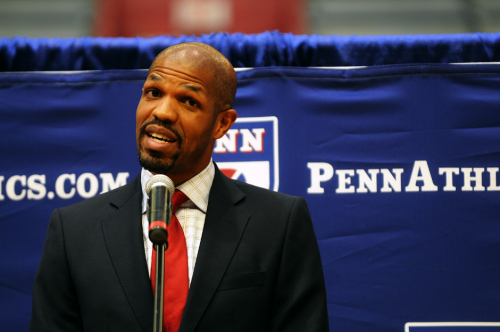
Bilsky says it’s only fair to judge Jerome Allen after the men’s basketball coach brings in at least a couple of more more recruiting classes.
Is next year kind of like a make-or-break year for the men’s basketball team?
No, it really isn’t. When Jerome [Allen] was hired, as any coach would be, you say that you can’t really define any success until the person’s had a chance to have four full recruiting classes. If you didn’t do that, you’d see coaches like Bobby Knight and Digger Phelps and Mike Krzyzewski [fired] in their first two of three years. So I think probably in fairness, two years from now you’ll have a good sense what Jerome’s able to produce.
You have to be pretty happy about the other basketball program and the job Mike McLaughin has done so far, right?
Yeah, it’s very heartwarming because they’re good people and they’re good coaches. As much as you like to speed things up – everyone wants to win now, whether you’re a coach or a player or a fan – you have to develop a program. And Mike’s really done a good job of developing a basketball program. And they play good fundamentally sound basketball. And the results showed it this year for sure.
In general, as far as the next few years in Penn athletics go, are you feeling pretty good about everything right now?
I am because I think this campaign and what we’ve been able to do with it has just given us such an opportunity to kind of take off from where we are now. So when you have recruits visiting and they see the phenomenal facilities, it speaks to commitment the University has to the programs. I think we’ll be in a position to take off. There are a lot of dynamics that go into the Ivy League. I mean everyone else is trying to be good too. And there’s financial aid dynamics and admission dynamics that are at work, so you really have to be exceptional to win. But we’ve probably never been in a better position in terms of facilities and financially as we are right now.
Are you going to keep doing this job for a while?
I’ve said this for a long period of time: you’ve got to assess it every year. You look for new goals and you look for new challenges in life – whether it’s doing this or doing something else. I’ve never really had much of a chance to think about that because this campaign was so consuming, but at some point I’ll hang it up. And I’ll feel good about it because I’ll be able to pass it on to somebody in what I consider really good shape.

